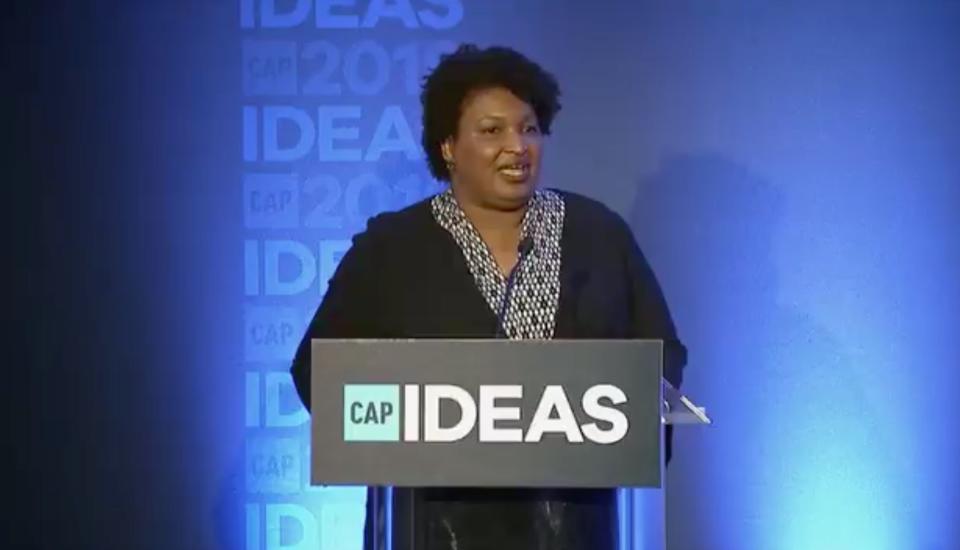‘We won’: Stacey Abrams makes the case for identity politics

WASHINGTON — “We won,” Stacey Abrams told progressives gathered in Washington for the annual Center for American Progress Ideas Conference, which functions as a casting call for potential national candidates.
Abrams quickly acknowledged that she had not, in fact, won her bid to become Georgia’s governor last November, losing a fiercely contested race to Brian Kemp, the Republican candidate. Abrams charged that Kemp, who was Georgia’s secretary of state, worked to suppress voter participation in communities of color. Since her loss, she has become a vociferous proponent of voting rights.
And although she has not made her intentions known, Abrams remains an intriguing potential 2020 candidate for progressives. She recently declined to run for the U.S. Senate, raising the prospects that she may yet seek the Democratic nomination for the presidency. A recent survey of African-American voters by the Washington Post found that “her name came up repeatedly in interviews with voters and activists who described her as a bona fide champion for African-Americans far beyond her home state.”
Her eagerness was apparent on Wednesday morning, with Abrams coming out on the stage before Neera Tanden, the president of the Center for American Progress, had finished with her introduction.
“I do recognize that I am not the governor of Georgia,” Abrams said, a reference to her conviction that the gubernatorial mansion would have been hers were it not for Kemp’s machinations. Nevertheless, she argued, progressives had won the day in Georgia, noting that she had tripled Latino turnout while also greatly increasing electoral participation among Asian-Americans, African-Americans and younger voters.

She described this as a “transformation of the electorate,” hinting at a potent coalition not unlike the one Barack Obama mustered in his successful bid for the White House in 2008. Abrams added that even in losing, she had “accomplished something no one has accomplished since Bill Clinton: “I increased the white share of Democratic votes in the state of Georgia.” That, too, proved a successful formula for Democrats, even if the demography of the United States is not what it was when Clinton emerged as an unknown Arkansas governor to defeat George H. W. Bush for the presidency.
Abrams seemed to make the kind of ecumenical pitch Clinton might have made: that Georgians of all races and creeds wanted economic opportunity and expanded health coverage. But this pitch came with a twist in Abrams’s case. None of that would be possible, she argued, if Republican governors, secretaries of state and legislatures are able enact measures that disenfranchised communities of color where support for Democrats remain strong.
Abrams called efforts to make voting more difficult, which are in contravention of the Voting Rights Act, “the single most threatening aspect of our election system” and “the worst part of what’s happening in our democracy.”
And she noted that many other states, from Tennessee to Michigan, had moved to enact measures that could make it more difficult for people to vote. Abrams described these as a “systemic attempt to push against the demographic changes in our country for the last 20 years.”
There was another twist to the kinds of appeals both Clinton and Obama made to voters. Instead of invoking the vision of a colorblind America, Abrams openly embraced the notion of identity politics. “Identity politics is exactly who we are,” Abrams said, evidently speaking of her gubernatorial campaign, “and it’s exactly how we won.”
Abrams argued that “when we refuse to engage in the conversation of identity politics, when we refuse to acknowledge that we see you, and we understand you, and we understand the barriers that you face, then what we are met with is a lack of trust.” She added that “no reason to engage and no reason to show up.”
She criticized “Democratic candidates” for “decrying the identities of their voters,” though she did not say whom she was talking about or what exactly those candidates had said.
Near the conclusion of her remarks, Abrams said that the way forward was not “having everyone in America run for president,” a reference to the field of two dozen candidates vying for the Democratic nomination.
The line earned loud cheers. “But that is also not an announcement,” Abrams quickly added, leaving her own political future an open question.
_____
Read more from Yahoo News:



